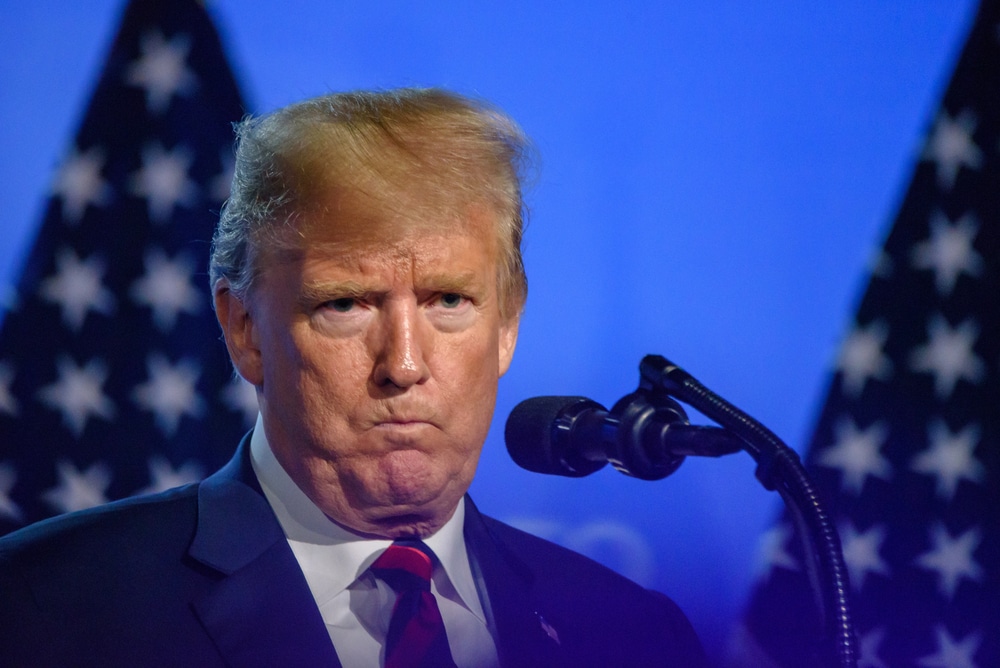Former President Donald Trump could return to power in 2025. We can expect a second Trump administration to give us more of the same: economic nationalism. This is concerning because economic nationalism degrades our economy, impoverishes our citizens, and promotes war.
The United States Imperial Government (USIG) has the best propaganda in the world. That propaganda revolves around an imperial passion play in which the state is God, the corporation is Satan, and capitalism is the eternal scapegoat.
President Joe Biden deployed this narrative brilliantly during his 2024 State of the Union address:
“Look, too many corporations raise prices to pad their profits, charging more and more for less and less. That’s why we’re cracking down on corporations that engage in price gouging and deceptive pricing, from food to healthcare to housing. In fact, the snack companies think you won’t notice if they change the size of the bag and put a hell of a lot fewer—(laughter)—same—same size bag—put fewer chips in it. No, I’m not joking. It’s called ‘shrink-flation.’
Pass Bobby Casey’s bill and stop this. (Applause.) I really mean it. You probably all saw that commercial on Snickers bars. (Laughter.) And you get—you get charged the same amount, and you got about, I don’t know, 10 percent fewer Snickers in it. (Laughter.)”
Hilarious! The state privileges the Federal Reserve System to increase the money supply (promoting a general rise in prices) and then Biden blames the snack companies. It would have been refreshing if he had at least called out truly evil corporations. Imagine if he’d said instead, ‘Look, too many weapons manufacturers fund think tanks to push for war, donate to politicians to push for war and advertise on what the great Bill Buppert calls the ‘coprophile media’ to push for war. And then we go to war. And we need your children. No, I’m not joking. We need to send your children to kill and die and suffer. I really mean it. We might have to reactivate military conscription.’
When pursuing domestic imperialism, the state demonizes corporations, but when it shifts to international imperialism the state casts rival states as the villain. Foreign corporations certainly get demonized and attacked, but with the rationale that they serve foreign states. There’s no confusion about who has the power when Uncle Sam starts dropping hell fire on a foreign adversary. And it ain’t the snack companies.
Despite the demonization, the state is allied with corporations. Big corporations love big government and it’s understandable that leftists view the state as a corporation with shareholders such as finance, defense and aerospace, energy, agriculture, healthcare, technology, and telecommunications. By the way, the “snack companies” spend more money on influencing government than you do, so don’t expect a righteous war on shrink-flation.
The state rewards its big business allies through regulatory and tax policies to protect them from competition, both domestic and foreign. Economic nationalism is the leveraging of the myth of the “imagined community” that is the nation to justify privileging big business (some producers) at the expense of the people (consumers) and everyone else. Better terms are “mercantilism” or “economic fascism” or “state-sponsored, supply-side terrorism.”
The polices and taxes levied behind the propaganda of economic nationalism means higher prices for lower quality goods, fewer jobs, and less opportunity. And like all propaganda, it doesn’t even make sense.
What’s so insidious is that the problems being blamed on foreigners are being created by the domestic imperial overlord, and this dynamic can (and does) lead to deadly foreign wars. And those wars can be viewed as economic nationalism, in the perspective of the late Justin Raimondo:
“…if we strip away the façade of the state and get a look at the real actors in this age-old bloody drama, what stands revealed is the money power. War and preparations for war hurt a great many people. But a very few are enriched. The beneficiaries are first of all the central banks that make enormous profits loaned to these governments.”
The central bank is at the apex of state privilege. This is why so much libertarian discourse focuses on the Federal Reserve, America’s fourth incarnation of central banking. The money power is so monstrous, in 1832, President Andrew Jackson famously vetoed a bill to renew the charter of the Second Bank of the United States (BUS), which was America’s third central bank. In is veto message he said:
“It is maintained by some that the bank is a means of executing the constitutional power ‘to coin money and regulate the value thereof.’ Congress have established a mint to coin money and passed laws to regulate the value thereof. The money so coined, with its value so regulated, and such foreign coins as Congress may adopt are the only currency known to the Constitution. But if they have other power to regulate the currency, it was conferred to be exercised by themselves, and not to be transferred to a corporation.”
According to Mises Institute President Thomas J. DiLorenzo, Jackson demonized the BUS with spicy gothic rhetoric, calling it:
“…a hydra headed monster, equipped with horns, hooves and a tail so dangerous that it impaired the morals of our people, corrupted our statesmen and threatened our liberty. It…bought up members of Congress by the dozen, subverted the electoral process and sought to destroy our republican institutions.”
While it is commendable that Jackson actually fought the money power instead of pretending to fight Frito Lay, he was still part of the bigger and much more dangerous monster: the state.
Donald Trump’s promise to inflict more economic nationalism on Americans is a promise to promote more wars; potentially civilization ending wars. As Ludwig von Mises said:
“The philosophy of protectionism is a philosophy of war. The wars of our age are not at variance with popular economic doctrines; they are, on the contrary, the inescapable result of a consistent application of these doctrines.”

































